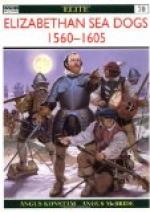The patent then goes on to provide for a royalty to His Majesty of one-fifth of the net profits, to exempt the patentees from custom duty, to exclude competition, and to exhort good subjects of the Crown to help the Cabots in every possible way. This first of all English documents connected with America ends with these words: Witnesse our Selfe at Westminster, the Fifth day of March, in the XI yeere of our reigne. HENRY R.
* * * * *
To sayle to all Partes of the East, of the West, and of the North. The pointed omission of the word South made it clear that Henry had no intention of infringing Spanish rights of discovery. Spanish claims, however, were based on the Pope’s division of all the heathen world and were by no means bounded by any rights of discovery already acquired.
Cabot left Bristol in the spring of 1497, a year after the date of his patent, not with the ‘five shippes’ the King had authorized, but in the little Matthew, with a crew of only eighteen men, nearly all Englishmen accustomed to the North Atlantic. The Matthew made Cape Breton, the easternmost point of Nova Scotia, on the 24th of June, the anniversary of St. John the Baptist, now the racial fete-day of the French Canadians. Not a single human inhabitant was to be seen in this wild new land, shaggy with forests primeval, fronted with bold, scarped shores, and beautiful with romantic deep bays leading inland, league upon league, past rugged forelands and rocky battlements keeping guard at the frontiers of the continent. Over these mysterious wilds Cabot raised St. George’s Cross for England and the banner of St. Mark in souvenir of Venice. Had he now reached the fabled islands of the West or discovered other islands off the eastern coast of Tartary? He did not know. But he hurried back to Bristol with the news and was welcomed by the King and people. A Venetian in London wrote home to say that ’this fellow-citizen of ours, who went from Bristol in quest of new islands, is Zuan Caboto, whom the English now call a great admiral. He dresses in silk; they pay him great honour; and everyone runs after him like mad.’ The Spanish ambassador was full of suspicion, in spite of the fact that Cabot had not gone south. Had not His Holiness divided all Heathendom between the crowns of Spain and Portugal, to Spain the West and to Portugal the East; and was not this landfall within what the modern world would call the Spanish sphere of influence? The ambassador protested to Henry VII and reported home to Ferdinand and Isabella.
Henry VII meanwhile sent a little present ’To Hym that founde the new Isle—L10.’ It was not very much. But it was about as much as nearly a thousand dollars now; and it meant full recognition and approval. This was a good start for a man who couldn’t pay the King any royalty of twenty per cent. because he hadn’t made a penny on the way. Besides, it was followed up by a royal annuity of twice the amount and by renewed letters-patent for further voyages and discoveries in the west. So Cabot took good fortune at the flood and went again.




